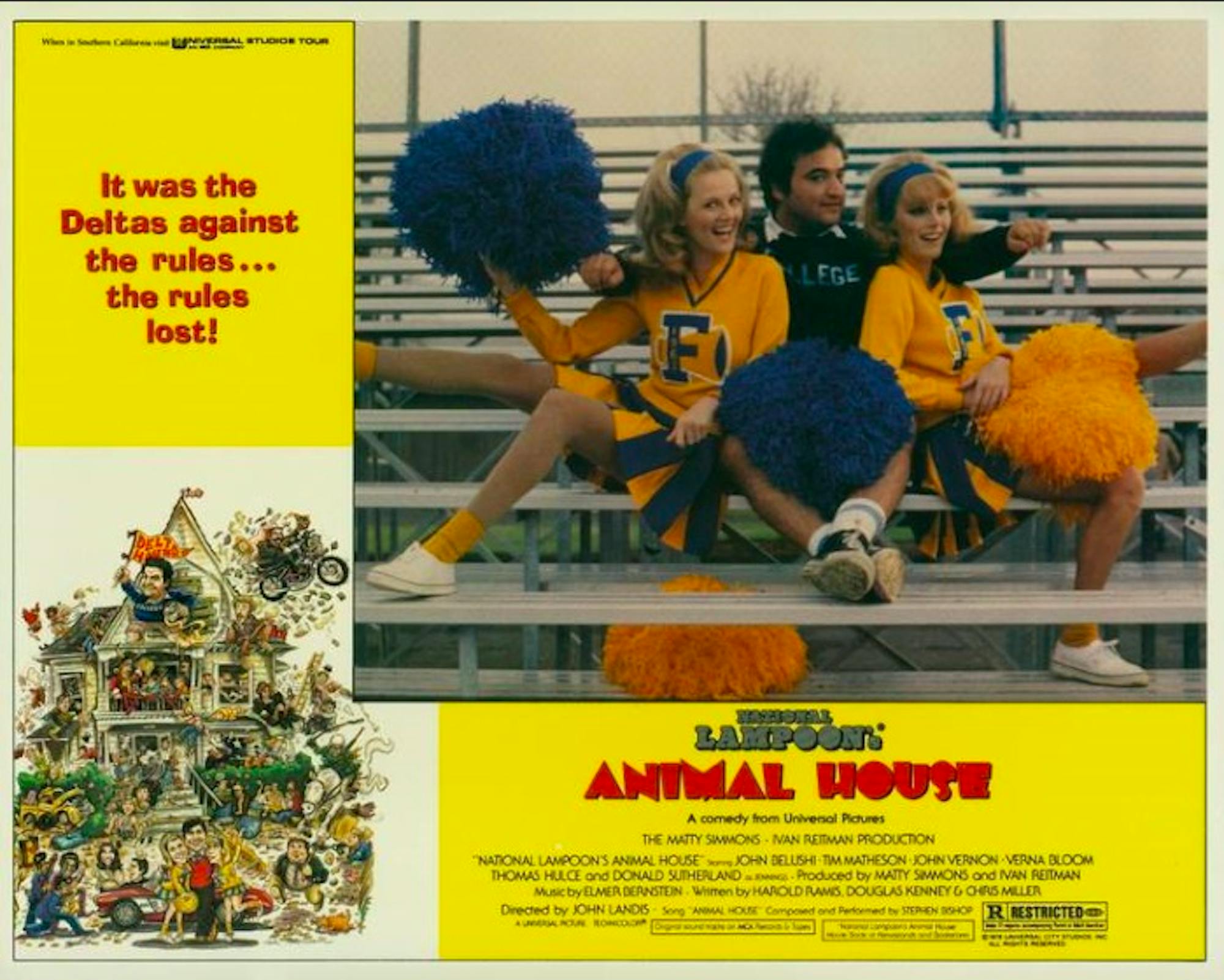Content warning: This article mentions rape.
"National Lampoon's Animal House" (1978) turned 40 this July.The movie follows two college first-years in 1962, Larry Kroger (Thomas Hulce) and Kent Dorfman (Stephen Furst), who join the Delta Tau Chi fraternity and engage in unspeakable hijinks while fighting the Faber College administration, the posh rival fraternity Omega Theta Pi and their own livers. It has been hailed as a classic raunch-fest and is perhaps the most famous college movie of all time, but in light of the #MeToo movement and the controversies surrounding Greek life at Tufts, what does "Animal House" mean today?
In the first exchange of the movie, Larry and Kent stand nervously outside the Omega meet-and-greet with clownish hats compulsory for first-years, as Larry says, "Take off that beanie... Don't be a fruit, okay?" Already, the use of homophobic slang does not bode well for "Animal House" through a modern lens. But as the first-years move into the Omega house, it becomes apparent that they have every reason to be insecure. Immediately, the Omega president ostracizes them into a corner with the other social rejects, including nerds, mute hipsters and the only handful of non-white people at the party (including, notably, one "Mohammed")."Animal House" is full of legendary scenes, but this is not one of them. It does say much about the movie's message: Social norms can be cruel and hard to navigate, and the stress of fitting in with public decorum and status is very real. It also calls to attention the elitism and racism of the fraternity system, making the scene relatable today in a different, disturbing way.
Now, the alternative fraternity, Delta, is not a particularly good one: It is reckless, aggressive and no more racially diverse or conscious. Every woman in the movie is treated as a sex object by the male characters, many of whom engage in voyeurism and emotional manipulation. The most upsetting part of the movie is Larry's romantic subplot with Clorette, who passes out drunk and topless while an angel and a devil appear on Larry's shoulders, debating whether to rape her.Later, he finds out that she's 13.Disturbingly, both moments are played for laughs. Other low moments include a professor sleeping with a student and the uncomfortable scene of (white) Delta brothers in an exclusively African-American bar. In the scene where the Deltas must defend themselves in the school's judiciary process, one even uses the "few bad apples" argument. The problem is that this logic does not hold up in the context of drinking, or any other misbehavior, as we see how the worst examples of Delta culture are passed down from its older members to the first-years.
These are the glaringly terrible moments of "Animal House," but the fact of the matter is that most of the movie is laugh-out-loud hilarious. John Belushi's performance as the deranged, hard-drinking Bluto is one of the greatest performances in the history of comedy; his eyebrows alone deserved an Oscar. A more underrated performance is John Vernon as the stuffy, furious Dean Vernon Wormer, who skims off student funds and takes sadistic glee in fighting degeneracy. The gags are timeless, and even the edgy, borderline humor holds up in a meta-commentary, "South Park" kind of a way.
What saves "Animal House" is not just the laughs but the fact that, in reality, not much has changed. The reckless antics of the Delta brothers are undercut by the political stresses of the 1960s, namely the Vietnam War, and through the gags, it is clear that these guys just do not want to grow up in such a demoralizing world. Many of us have wanted to share a smoke with our free-thinking English teachers, just like we want to walk up to that guy with a guitar (or its modern countercultural equivalent, the ukulele) at a party and smash it. Yuppies have only become more insufferable. The stupidity of Larry and Kent's being christened "Pinto" and "Flounder" by the Deltas is not that different than the ridiculous nicknames given to each other by fraternity members today.
In the end, "Animal House" is a silly, imperfect defense of catharsis in youth society. It is subversive, as comedy should be, and took many risks that may have paid off upon its original release, but subject it to well-deserved outragetoday. This is a shame, because the core of the movie still rings true. The state of the Tufts fraternity system may mean that this form of catharsis has met its end. But in the face of Tufts' Naked Quad Run ban andaggressive policing to combat the threat of school shootings, there may be some value in casting aside the growing seriousness of campus life and having a laugh now and then. After all, nothing is over until we decide it is.
'Animal House' remains relevant, edgy 40 years later

A promotional poster for 'Animal House' (1978) is pictured.





